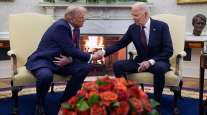Senior Reporter
Biden to Sign $1 Trillion Infrastructure Bill Nov. 15

[Stay on top of transportation news: Get TTNews in your inbox.]
A $1 trillion infrastructure package that includes billions of dollars for roads and bridges and creates a program that will bring younger drivers into the trucking industry will be signed into law by President Joe Biden on Nov. 15, the White House confirmed.
The Infrastructure Investment and Jobs Act, approved Nov. 5 by a vote of 228-206 during a late-night voting session in the U.S. House of Representatives, dedicates about $100 billion for highways and bridges, $66 billion for freight and passenger rail operations, $65 billion for rural broadband internet access, $46 billion for severe weather-resilience climate change programs, $39 billion for transit systems and $25 billion for modernization projects at airports.
Specific to trucking, the bill creates a training and apprenticeship program for drivers younger than 21 to drive Class 8 trucks in interstate commerce. The Developing Responsible Individuals for a Vibrant Economy (DRIVE) Safe Act, was sponsored by a bipartisan group of lawmakers.
Thirteen House Republicans voted for the overall bill. The Senate approved the legislation in the summer.
The approved measure fulfills one half of Biden’s big-picture Build Back Better domestic agenda. On Nov. 6, he praised the bill’s passage.
“It’s going to create more jobs, good-paying jobs, union jobs that can’t be outsourced, and they’re going to transform our transportation system with the most significant investments in passenger rail — the most significant investment in 50 years. In roads and bridges, the most significant investment in 70 years. And more investment in public transit than we’ve ever, ever made,” he said from the White House.
Secretary of Transportation Pete Buttigieg, credited with shepherding support for the legislation on Capitol Hill, added, “The infrastructure bill will rebuild and replace infrastructure that is decades, or even a century, old. Now, we begin the work of building infrastructure that will support the traveling public and ensure an economically competitive America for generations to come.”
Per analysis from American Trucking Associations, the bill will provide a 38% increase in funding for surface transportation systems over the next five years. The increase would amount to nearly $500 billion in new funding, including $347.5 billion for highways and $37 billion for bridges.
Happening now: President Biden delivers remarks on the House of Representative’s passage of the Bipartisan Infrastructure Deal. https://t.co/D6NNqtNmVx — The White House (@WhiteHouse) November 6, 2021
Industry stakeholders celebrated the bill’s passage.
“Roads and bridges are not political,” said ATA President Chris Spear. “We all drive on them. A majority in the House realized this today and did what’s right for the country, not themselves. From farmers to truckers, the millions of hard-working people who make this country great won today. Those lawmakers who put their constituents before themselves to help seal this achievement have cemented a lasting legacy that the American people will now see, feel, and use for many decades to come.”
Spear added, “After countless hearings and meetings on Capitol Hill, ATA members will finally see the fruits of their labor: a 38% increase in road and bridge funding, and an infusion of highly-trained, younger talent into our workforce.”
Roads and bridges are not political—we all drive on them.
A majority in the House realized this tonight and did what’s right for the country, not themselves. #InfrastructureNowhttps://t.co/Sv846fhocR — American Trucking (@TRUCKINGdotORG) November 6, 2021
“Roads and bridges are not political,” ATA President Chris Spear said after the bill’s passage. “We all drive on them. A majority in the House realized this today and did what’s right for the country, not themselves. From farmers to truckers, the millions of hardworking people who make this country great won today. Those lawmakers who put their constituents before themselves to help seal this achievement have cemented a lasting legacy that the American people will now see, feel, and use for many decades to come.”
Spear added, “After countless hearings and meetings on Capitol Hill, ATA members will finally see the fruits of their labor: a 38% increase in road and bridge funding, and an infusion of highly trained, younger talent into our workforce.”
The DRIVE Safe Act is intended to address an industrywide shortage of truck drivers. ATA Chief Economist Bob Costello recently indicated trucking is short at least 80,000 drivers.
The bill also includes a five-year extension of the FAST Act, the nation’s underlying highway law, which was set to expire Dec. 3.
Passage of the bill came after months of intraparty negotiations between moderate and progressive Democrats. Speaker Nancy Pelosi (D-Calif.) insisted the legislation would “create good-paying jobs across the country building the infrastructure of our country.”
Bill Highlights
Roads, Bridges
The bill spends $110 billion on roads, bridges and other major projects. This includes $40 billion for bridge repairs and replacement, as well as about $16 billion for major projects. It also would reauthorize the surface transportation program for the next five years.
Electric Vehicles
The bill would spend $7.5 billion to build a nationwide network of charging stations for electric vehicles to help accelerate the adoption of non-fossil fuel cars.
Transportation Safety
The plan would spend $11 billion on transportation safety, including programs to reduce crashes and fatalities, especially for cyclists and pedestrians.
Bloomberg News
The bill’s sponsors also argued its provisions would promote freight connectivity to alleviate supply chain woes at commercial ports.
Per Dennis Truax, president of the American Society of Civil Engineers, “With this legislation, the federal government will restore their critical partnership with cities and states to modernize our nation’s roads, bridges, transit systems, drinking water pipes, school facilities, broadband, ports, airports and more.
“Without a strong federal partner, local projects that are community lifelines have hung in the balance, oftentimes being paused or outright canceled due to funding uncertainties. When this happens, American households and businesses are the ones who pay the price.”
U.S. Chamber of Commerce CEO Suzanne Clark called the bill “the single largest investment in bridges since construction of the Interstate Highway System and the single largest investment made to address climate change in U.S. history.”
Prior to the vote, House Minority Leader Kevin McCarthy (R-Calif.) blamed Biden for ongoing challenges associated with the nation’s supply chain and for consumers paying higher prices for gasoline.
“Every element of his philosophy and policy has been a failure,” he said.
Separate from the infrastructure measure, during the week of Nov. 15 House Democratic leaders plan to launch consideration of a nearly $2 trillion social infrastructure budget package. If approved in the House, the bill would move to the Senate and be considered via a fast-track reconciliation process. The social infrastructure measure reflects significant aspects of the second tier of Biden’s Build Back Better agenda.
Want more news? Listen to today's daily briefing below or go here for more info:




